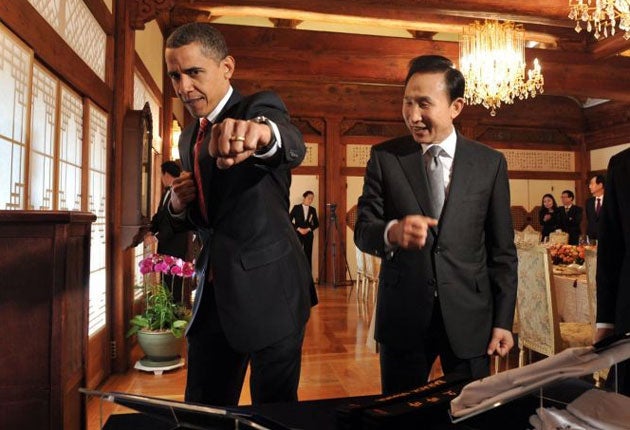Behind Asia's nice manners, tough lessons for Obama
Frustrating tour of Asia has left America with much to think about

Your support helps us to tell the story
From reproductive rights to climate change to Big Tech, The Independent is on the ground when the story is developing. Whether it's investigating the financials of Elon Musk's pro-Trump PAC or producing our latest documentary, 'The A Word', which shines a light on the American women fighting for reproductive rights, we know how important it is to parse out the facts from the messaging.
At such a critical moment in US history, we need reporters on the ground. Your donation allows us to keep sending journalists to speak to both sides of the story.
The Independent is trusted by Americans across the entire political spectrum. And unlike many other quality news outlets, we choose not to lock Americans out of our reporting and analysis with paywalls. We believe quality journalism should be available to everyone, paid for by those who can afford it.
Your support makes all the difference.Barack Obama's first trip to Asia, which ended yesterday, has underscored two related truths about America and its 44th president. In his foreign dealings Mr Obama is long on charm and reason but – thus far at least – short on concrete results. And people don't listen to the United States like they used to.
To be fair, spectacular results were never expected from his eight-day visit that took in Japan, an Asia Pacific Economic Cooperation summit in Singapore, China and South Korea. Mr Obama, who was born in Hawaii and spent part of his childhood in Indonesia, has described himself as "America's first Pacific president". But the reality is that relations between the US and the two largest Asian pacific powers are in a state of flux.
A more assertive government in Japan, for decades comfortable under the American security umbrella, is at odds with Washington over the relocation of a Marine base on Okinawa. In China, his most important stop, leaders of the emerging colossus showed they were in no mood to listen to lectures on human rights or the management of its economy.
Indeed, colouring everything was the shifting balance between the massively indebted and recession-plagued country led by Mr Obama, and an economically surging Asia, led by China whose cheap exports fuelled America's long consumption boom.
Against this backdrop, there was little likelihood of a breakthrough on climate change between the world's two biggest polluters. An agreement to work together on the issue is a long way from an agreement on action. Even yesterday's discussions in South Korea, considered the easiest leg of the trip, produced little new.
Inevitably, there have been complaints that Mr Obama has been too nice. His bow to the Japanese emperor, it has been objected, was too low and obsequious. His Chinese hosts were, naturally, formal politeness personified. But in substantive terms they kept the US president on a short leash, restricting access and coverage of his town hall meeting in Shanghai. For his part Mr Obama did not choose to dwell greatly on China's poor record on free speech and human rights.
Some commentators draw comparisons between Mr Obama and Hu Jintao's meeting and the 1961 summit in Vienna between another charismatic US president and a battle-hardened Communist leader. On that occasion John F Kennedy was put through the wringer by the Soviet Union's Nikita Khrushchev. Whether Mr Obama got similar treatment is unclear. But, noted David Gergen, a former adviser to both Democratic and Republican White Houses: "It would seem wise not only for President Obama but for all Americans to treat this as a wake-up call."
Join our commenting forum
Join thought-provoking conversations, follow other Independent readers and see their replies
Comments